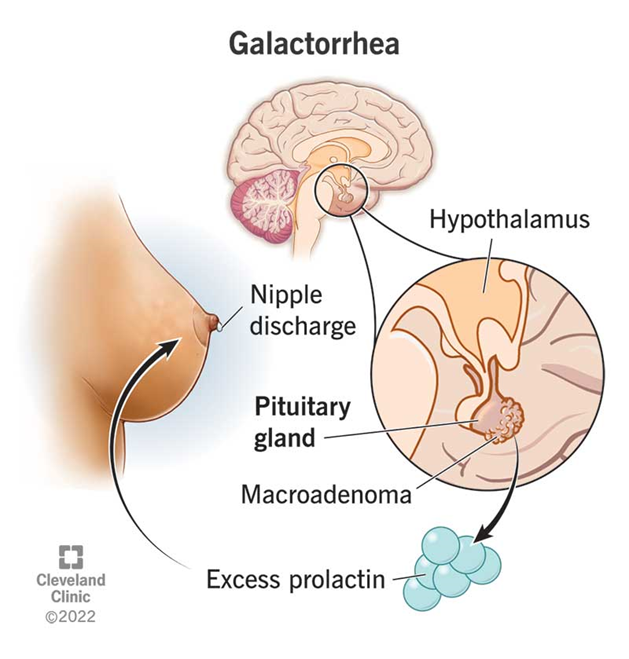Laboratory results reveal elevated levels of prolactin in a client diagnosed with Schizophrenia. Which symptoms should the nurse expect to observe? Select all that apply.
Galactorrhea
Gynecomastia
Social withdrawal
Apathy
Anhedonia
Correct Answer : A,B
Choice A reason: Elevated prolactin levels can lead to galactorrhea, which is the production of breast milk in individuals who are not breastfeeding.

Choice B reason: Gynecomastia, the enlargement of breast tissue in males, can also be a symptom associated with high prolactin levels.
Choice C reason: Social withdrawal is a symptom of Schizophrenia but is not directly related to elevated prolactin levels.
Choice D reason: Apathy can be a symptom of Schizophrenia but is not directly related to elevated prolactin levels.
Choice E reason: Anhedonia is a symptom of Schizophrenia but is not directly related to elevated prolactin levels.
Nursing Test Bank
Naxlex Comprehensive Predictor Exams
Related Questions
Correct Answer is ["A","B","D","E"]
Explanation
Choice A: Hyperventilation
Hyperventilation is rapid breathing that usually occurs because of anxiety or panic. This leads to low levels of carbon dioxide in your blood which causes a number of symptoms. Hyperventilation in anxiety can be a tricky thing to understand. On one hand, it can feel like you're suffocating or not getting enough air. On the other hand, hyperventilation can also cause shortness of breath, chest pain, and lightheadedness.
Choice B: Irritability
Irritability is a common symptom of Generalized Anxiety Disorder (GAD). Individuals with GAD often experience severe feelings of fear and unease and report feeling restless and irritable that interfere with the quality of their life.

Choice C: Anorexia
While there is a relationship between anxiety disorders and anorexia nervosa, anorexia is not a common symptom of Generalized Anxiety Disorder (GAD). Anorexia nervosa is a separate disorder that involves a fear of gaining weight and a distorted body image.
Choice D: Insomnia
Insomnia is highly prevalent in psychiatric disorders, and it has significant implications. The anxiety that characterizes GAD often interferes with the ability to sleep and leads to insomnia. This is not unexpected. Anxiety might be viewed as an inappropriate escalation of a response called arousal.
Choice E: Fatigue
Fatigue is a common symptom of Generalized Anxiety Disorder (GAD). Individuals with GAD may feel restless and have trouble relaxing. They may also tire easily or feel tired all the time.
Correct Answer is ["A","C","E"]
Explanation
Choice A reason:
Individuals with Paranoid Personality Disorder often exhibit distrust and suspicion of others. A matter-of-fact approach is beneficial as it avoids emotional engagement that could be perceived as threatening or deceitful. This approach helps in maintaining clear boundaries and reduces the potential for misunderstanding or paranoia.
Choice B reason:
For those with Avoidant Personality Disorder, a matter-of-fact approach might not be as effective because these individuals are often sensitive to negative evaluation and rejection. They may require a more supportive and encouraging approach to help them feel more comfortable in social interactions.
Choice C reason:
People with Schizotypal Personality Disorder display eccentric behaviors and have difficulty forming close relationships. A matter-of-fact approach can provide structure and clarity without overwhelming them with emotional intensity, which they may find difficult to process.
Choice D reason:
Individuals with Narcissistic Personality Disorder may not respond well to a matter-of-fact approach as they often have an inflated sense of self-importance and a need for admiration. They may perceive this approach as dismissive or not adequately acknowledging their perceived self-worth.
Choice E reason:
Those diagnosed with antisocial personality disorder tend to disregard the rights of others and may manipulate or treat others harshly. A matter-of-fact approach is useful as it sets clear expectations and limits, which is necessary to manage potentially manipulative or harmful behaviors.
Whether you are a student looking to ace your exams or a practicing nurse seeking to enhance your expertise , our nursing education contents will empower you with the confidence and competence to make a difference in the lives of patients and become a respected leader in the healthcare field.
Visit Naxlex, invest in your future and unlock endless possibilities with our unparalleled nursing education contents today
Report Wrong Answer on the Current Question
Do you disagree with the answer? If yes, what is your expected answer? Explain.
Kindly be descriptive with the issue you are facing.
